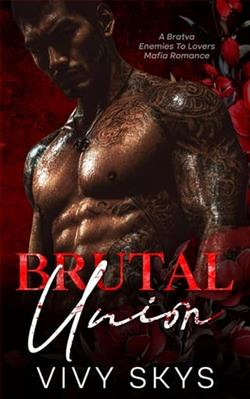Page 36 of Weave me a Rope
Seven weeks after he was first brought here, Spen had no more idea where he was than he had when he arrived. According to the calendar he was keeping on the wall next to his bed, it was late August. It was also still summer in the world beyond his window, and not, he thought, far to the north. The workers who occasionally crossed his view were often in their shirtsleeves and sometimes shirtless. His guards and footmen wore coats and trousers of summer-weight fabric.
More clues to his whereabouts were in the estate books he had been ordered to study. They had records of winter wheat and barley crops being sown in October. In the north, September was more likely. If, in fact, the estate books belonged to this property, and he had no evidence for that one way or the other.
He was standing at the window looking out at a pair of men scything the lawn when his usual footman arrived. Was it time for a meal already? No, for he could see the position of the sun by the shadow it cast. It was not yet noon.
“I am to shave you, sir, and help you change for a visitor,” the footman said.
“My father?” Spen asked and got the usual reply.
“I am not at liberty to say, sir.”
Spen had not yet washed after a vigorous exercise session. He did so, permitted the shave, and changed into the clothes the footman put out. Apparently, he needed to be clothed in the kind of formal daytime wear he would have worn in London to visit court or an older person he wanted to impress with his maturity and respect for protocol. A fitted coat, cut away at the front to show his breeches, and the bottom of his elegant, embroidered waistcoat, clocked stockings, leather shoes with low heels, and a snowy-white cravat intricately folded and adorned with a jeweled tiepin.
Which meant the visitor was not his father, probably. His father did not care to be kept waiting, and washing and changing had taken, Spen estimated, something like three-quarters of an hour. Besides, the marquess only noticed what Spen wore if it reflected in some way on the marquess.
Mickey came forward once Spen was dressed and apologetically showed him a shackle. “Have to put this on, Lord Spenhurst. You’re going downstairs.”
A struggle would be undignified and ultimately futile. Spen sat and offered his leg. Was there ever such a contrast as the court attire and the felon’s ankle bracelet? He shrugged. He could do nothing about it, and presumably the visitor, whoever he was, knew his circumstances.
Mickey opened the door into the hallway and stood waiting for Spen. His heart rate kicked up a step at the thought of leaving his chambers. He nearly rushed the door but managed to subdue the impulse, sauntering slowly out of the room as if nothing momentous was happening.
The other guards were waiting in the hallway and formed up around him. This time, they conducted him down another stair, to what must be the main reception level of the house, for in the hall at the bottom of the stairs was a set of large double doorsthat, if he was not mistaken, he had seen his father use to enter the house when they first arrived.
If this was one of the marquess’s estates, it must have been purchased within the past two and a half years, for he had been taken on a tour of the lands belonging to his family when he turned eighteen, and he’d never been here before. If he’d been asked to describe the place, he’d have called it “tired elegance”. It had once been a magnificent, and beautifully appointed, credit to the family that made it their home. Now, everything he saw needed cleaning, polishing, repairing, or painting.
They crossed the entry hall, and a footman opened a door. “Lord Spenhurst,” he announced to those within.
Spen paused in the doorway to assess the opposition. And opposition it was. His father, the Earl of Yarverton, and the earl’s daughter, Lady Daphne, all staring at him. The marquess glared. The earl smiled a greeting. Lady Daphne looked nervous as she curtseyed. Spen bowed to her in response and then took a few steps into the room. “My lords, my lady. Good day to you all.”
Lady Daphne giggled.
“Well, boy?” the marquess said. “Is that all you have to say to your betrothed?”
So, they were to lock horns immediately, were they? Spen was willing. “My betrothed is not in the room, my lord.”
“Your betrothed is Lady Daphne,” the marquess said, sternly.
“No, sir,” Spen insisted. “She is not. My apologies, Lady Daphne, but I have not and will not give my consent to this marriage.” He bowed again.
Lady Daphne giggled.
The earl rose, his face suffused with color. “Deerhaven!” he growled. “You told me the pup had come to his senses.”
The marquess also got to his feet. “You!” He was looking at Chatter. “Chain my son over there.”
“Over there” was a sofa by the window. They had been prepared, Spen realized. A chain descended from a ring-headed bolt that had been embedded in the wall behind the sofa. Chatter indicated the sofa with an inclination of his head. Would it be more dignified to resist? They’d force him anyway. He couldn’t fight all four guards, assorted footmen, and the two peers.
He walked over and sat on the sofa. Chatter knelt to lock the chain to his shackle. Spen fantasized about kicking Chatter on the chin and throwing himself backward out the window, but he figured the drop was about twelve feet to the paved courtyard. Not a good idea.
“Come,” the marquess said to the earl when Chatter stepped back. “Let us have a private discussion on these matters.” He looked around at the rest of the room. “Everyone out until I call for you.”
“Not you, Daphne,” the earl said to the lady. “Go and sit by Lord Spenhurst. Don’t be silly, girl. He won’t hurt you. You know what to do. Now do it.”
Lady Daphne’s giggle this time had an edge of hysteria, and tears started in her eyes, but she obeyed, sitting as far away from Spen as the sofa’s modest proportions allowed.
Spen could guess what they intended. He forced back the heated words that wanted to boil out of him. Nothing he said would change his father’s mind. But then nothing would change Spen’s mind, either.
When the two peers left the room, he passed Lady Daphne his handkerchief. “Dry your tears, my lady. I am not going to hurt you.”















